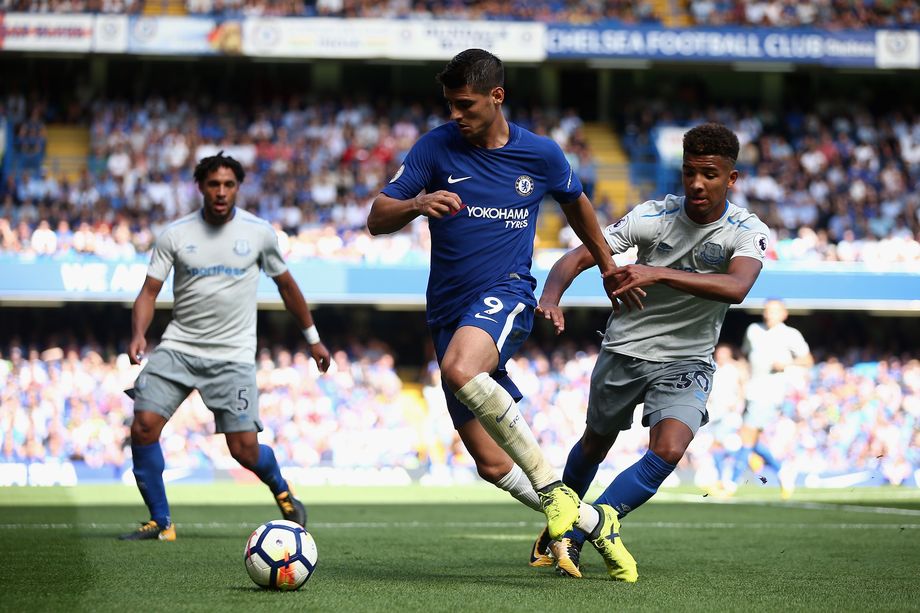For the second time in their history, Chelsea broken the club’s transfer record to sign a Spanish striker. Six years ago, the Blues invested £50 million to bring an already proven — although declining — world-class forward in Fernando Torres from Liverpool on deadline day of the winter transfer window. Now in the 2017 summer transfer window, the then baffling £50 million has become the norm for above-average players, and so Chelsea have paid a minimum of £58m, which may eventually reach £70m, for Real Madrid striker Álvaro Morata, a player who has yet to reach this “world-class” plateau.
In a remarkable and insightful interview with Diego Torres (he of anti-Mourinho fame) in Spanish newspaper El País, Chelsea’s no.9 reflected on the pressures that come with such a massive fee and his eagerness to pay back the trust shown in him by the Chelsea head coach and management.
“Destiny has given me a chance. It is true that I had some good matches [in my previous clubs], and I scored important goals, but you cannot expect a player to score these goals or to play in big matches only every once in a while. Football is consistency.”
“And now I find myself in a team that made an enormous financial effort for a Real Madrid back-up. At the end of the day, this is the reality of the matter. They have given me everything. Conte is putting all his trust on me, and so are the supporters and the club. For that, I have to make a impact.”
Morata arrived at Juventus in 2014 as an Antonio Conte signing, but he never had the opportunity to work with the Italian boss (Conte left to work with the Italy national team just days before Morata’s arrival in Turin). But in his first season at Juve, Morata found a lot of tactical remnants in from Conte’s three-year stay in Massimiliano Allegri’s plans.
As Conte often says, he is a tailor to his players, his schemes changing depending on which names he has available and the situation he has been put into. But according to Morata, despite the differences in players, shape and even the country in which they have been employed, these tactics remain true to their Italian core.
“In Juventus we played with two forwards and here [at Chelsea] we play with three. It is complicated because I come from Madrid and the [Spain] national team where you can play with spaces or not, depending on the situation. Tactically, Chelsea are Italian. You must fit in the scheme.”
“The forward always have to be the reference point to help your teammates. You have to fight against the centre backs and on physicality they are much stronger than in any other country. It is true that they are a bit too uncoordinated in their tactics and they offer you opportunities to score because they lose concentration, but it is another [style of] football.”
“In Spain you have time to think with the ball. Here if you hold onto the ball [for too long] they will have already given you two stamps.”
Returning to Spain after Real Madrid paid his buy-back clause to Juventus in the 2016 summer transfer window, Morata scored 20 goals in all appearances last season despite being only a back-up to Karim Benzema. His touch, turn and shot were often a lethal combination for any La Liga side trying to defend themselves from his menace. But the English game is different from what he knew in his home country, and tougher in some aspects. Whereas Spanish team gave him space and time to think, he no longer can afford that now. Now he has to look for different weaknesses to explore.
“At best the balls [when you play with your back against the goal] will not get to you like in Spain so you can play in one versus ones; but the balls that reach you will put you in a goal opportunity, or two or three. But it is all very quick. You do not have time to think. You have to play.”
“While in Spain, when you turn you have time to get your head up and look where the goalkeeper is and where you will shoot the ball. Here you just hit it. Which is why you do not see the kind of goals [I scored in Spain].”
“Your opponents catch you, in other times they go above you, and sometimes players just dribble through the entire team. This is why the Premier League is one of the most attractive leagues to watch.”
Thankfully, Morata seems to be a fast learner. And he is already picking up the finer details of Chelesea’s attacking tactics under Conte as well as the peculiarities of facing English teams week in and out.
“The difference [between Spain and Chelsea] is that Chelsea’s game is based on me. When we play with three upfront many times we face rivals which defend with a three-man back line, similar to what you find in Italy. The centre most centre-back follows me and the other two go one on one against the wide forward Willian [and] Pedro.”
“In Chelsea it is striking how they value the work of the centre forward. It is systematic. Virtually without looking, the team plays for you. Much like Italy did in the [2016] Euros: the ball reaches the wing back, he looks for the #9 on his first glance, and the #9 always had to be ahead of the center-back on the side of the ball so he can play and go, and look for the box.”
“It is hard to do that in England because in physicality it is one of the hardest competitions. They are athletes. But once I do that, if I hold the ball or win the aerial duel with the centre-back, or if Pedro or whoever else playing wide comes on a galloping run carrying the ball and I turn… From that point on it is another story.”
“Conte always told me that if I take this first ball and draw the opposition [away from play] there is an almost certain chance to score. The other day against Everton, Pedro and Willian had two opportunities each one of them in which the play came like this.”
On Saturday, Morata and the Spanish national team will be facing Italy for the second time since Conte’s Azzurri masterclass saw them eliminated in the Round of 16 at the 2016 Euros. Just like Juventus retained Conte’s influence in 2014-15, Morata is expecting to face many of Conte’s core ideas still in this games.
“Today’s Italian national team kept Conte’s tactics from 2016: one wide attacker comes, the other goes, the first lets the ball pass and turns around; the other gives it to him face to face and they will attempt both [chances]. In theory it is a very easy system for strikers because you see yourself getting support.”
“I used to play like that with [Carlos] Tévez at Juve: he would come, they gave him the long ball, and he would let it pass through to turn around and play it. I would go to the box to finish. Those are dynamics that adjust with work. Lots of tactical work and nothing else. It is beautiful because the teams in the Premier League usually go for the tackle first and fall for [the trick]. Conte is a great ‘lover’ of these tactics.”
-Álvaro Morata; Source: El País
It is not often that you see footballers talking in such detail about the tactical aspects of the game, but this isn’t the first time Morata has talked candidly about various issues (mental, tactical, structural, etc.) in the his own game and modern football in general. As on the pitch, so off of it, he’s proving to be a very intelligent player. If he applies himself to his full potential, the sky is the limit.














